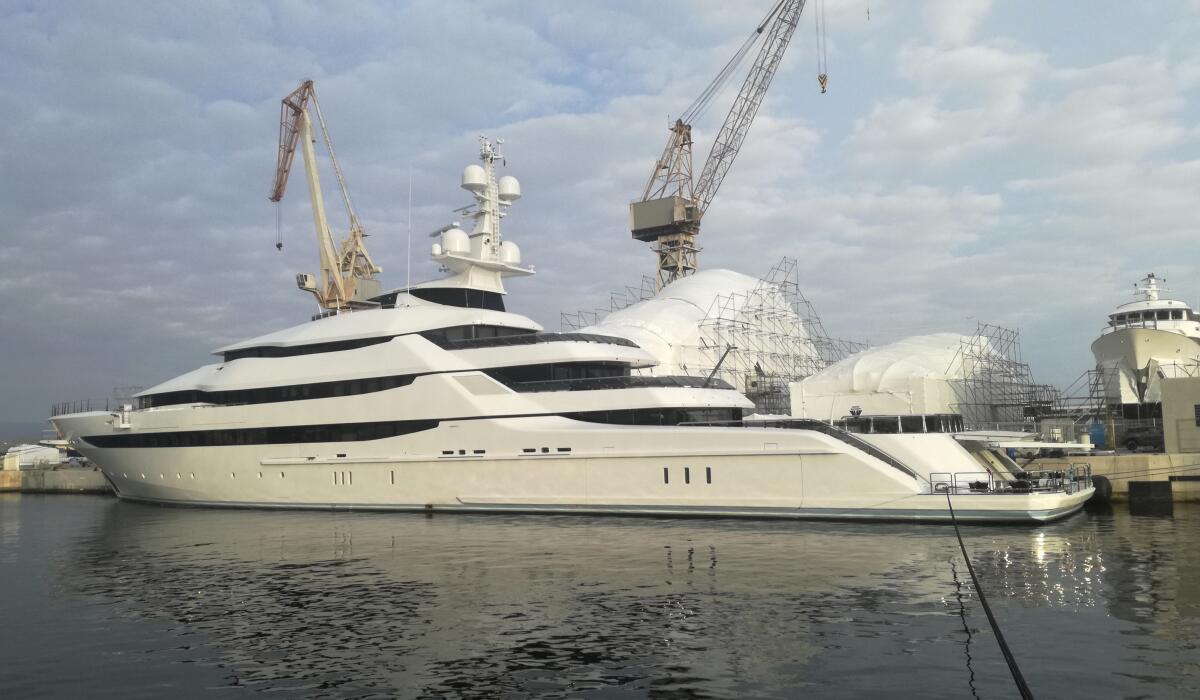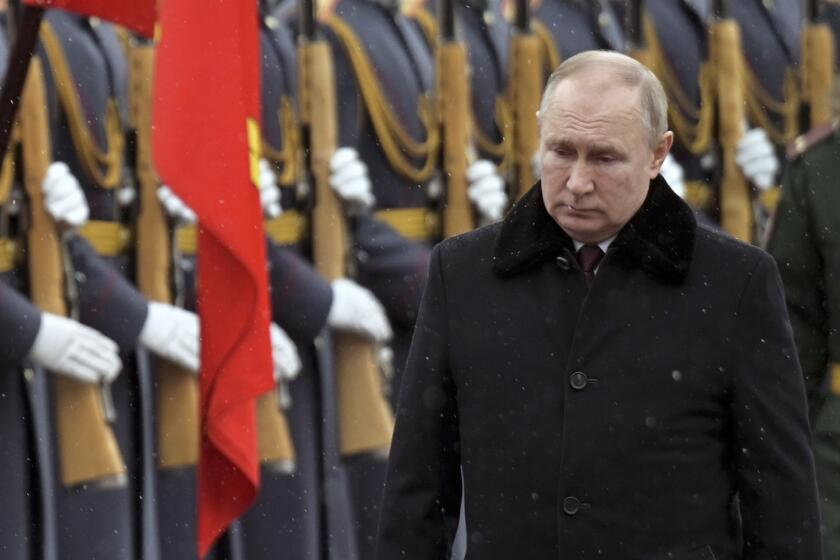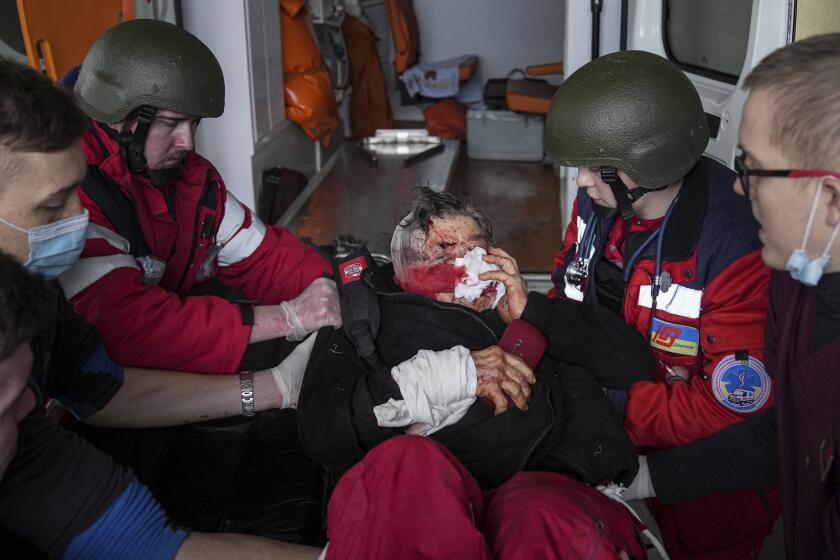Biden imposes sanctions on more oligarchs as Russia intensifies attack on Ukraine

- Share via
WASHINGTON — President Biden announced new sanctions Thursday on more than a dozen Russian oligarchs and their families, as pressure continued to build on Capitol Hill for an even tougher response to Moscow a week after it invaded Ukraine, particularly banning imports of Russian energy.
The White House imposed sanctions on 19 wealthy Russian individuals and 47 of their family members and close associates, including President Vladimir Putin’s spokesman, Dmitry Peskov, and Alisher Usmanov, one of the wealthiest men in Russia.
Unwilling to engage Russia’s military directly, the U.S. and Europe have also increased their shipments of weapons and other materiel to Ukraine in recent days, as television coverage of Russia’s unprovoked aggression and social media posts from Ukraine have galvanized the West.
Biden, outlining the new sanctions at the start of a Cabinet meeting Thursday, said prior actions to cut Russia off from the global financial system have had a “profound effect” already.
“The goal was to maximize the impact on Putin and Russia and minimize the harm on us and our allies and friends around the world,” he continued. “Our interest is in maintaining the strongest unified economic impact campaign on Putin in all history, and I think we’re well on the way to doing that.”
The U.S. restrictions will prohibit those sanctioned from traveling to the United States. By targeting the elites’ family members, the administration is aiming to prevent them from easily transferring assets to spouses or children, a loophole often used in similar situations to evade sanctions.
The latest move came amid new indications from Putin that he has no intention of halting the war until he has overrun all of Ukraine. And it marked the latest effort by Washington to force him to recalculate his strategy through a devastating economic pressure campaign.
On Wednesday, the Justice Department announced a team to enforce sanctions and export restrictions and to seize luxury assets belonging to Russia’s wealthiest citizens.
The Russian president is believed to be very wealthy, but his assets are in the name of relatives, associates and friendly oligarchs.
The administration and European allies have thus far avoided sanctioning Russia’s energy sector, attempting to mitigate the impact on global energy markets and consumers. By putting the financial screws to Russian millionaires and billionaires, the administration hopes it will be able to force those oligarchs to distance themselves from Putin and urge him to find a diplomatic offramp to end the war in Ukraine.
But so far the economic and geopolitical effects of the swift global response to Moscow — the ruble has nose-dived, Russian planes have been barred from European and U.S. airspace, and long-neutral countries such as Finland and Sweden have suggested a newfound interest in joining the North Atlantic Treaty Organization — have not deterred Putin. On Thursday after the Russian leader’s 90-minute telephone call with French President Emmanuel Macron, an Elysee Palace official concluded that Putin was determined to conquer Ukraine no matter the cost, stating flatly that “the worst is yet to come.”
A fire in a Ukrainian nuclear reactor has been extinguished, radiation levels remain normal and the plant is in the hands of Russian forces, authorities say.
As the shelling of Ukraine’s major cities continues a week after Putin began the invasion, political pressure continues to build in Washington for sanctions on Russia’s energy sector.
Republicans argue that going after the country’s energy exports would cripple Russia far more dramatically than other actions the U.S. has taken.
“Their Achilles’ heel is that their economy depends on oil and gas revenue. Never in the history of warfare have we had a chance to deliver such a decisive blow without firing a shot,” said Sen. Lindsey Graham (R-S.C.). “If the Ukrainians can stand up to a tank, if a grandmother can get a rifle, surely to God we can produce more oil and gas.”
Several Republicans as well as Democratic Sens. Joe Manchin III of West Virginia and Jon Tester of Montana have introduced bills to ban the U.S. import of Russian oil.
Although Europe is far more dependent on Russian energy resources, the U.S. buys almost 700,000 barrels of oil per day from Russia, according to Sen. Daniel Sullivan (R-Alaska).
“That’s $17 billion that we are putting into Putin’s war chest,” he said. “This is national security suicide.”
So far, the administration has hesitated to impose energy sanctions. The move, likely to wreak hardship on ordinary Russians, could rally them behind their leader. At the same time, such measures would probably increase oil prices on the global market and could lead to significant economic and political consequences in the U.S.
U.S. and its allies have held off on taking the toughest sanction against Russia over Ukraine, worried about risks of political and economic blowback.
“The president’s objective has been to maximize impact on President Putin and Russia while minimizing impact to us and our allies and partners,” White House Press Secretary Jen Psaki said Thursday. “We don’t have a strategic interest in reducing the global supply of energy.”
Many Democrats are skeptical of the idea, in part because it would require the U.S. to increase domestic production to make up for it, but top House Democrats are on board.
“I’m all for that. Ban it,” said House Speaker Nancy Pelosi (D-San Francisco). House Majority Leader Steny H. Hoyer (D-Md.) reiterated that position.
Although Sen. Christopher S. Murphy (D-Conn.) said that not buying Russian oil “feels like the right thing to do,” he expressed skepticism that Congress should start freelancing foreign policy separately from the White House.
“There’s no reason for us to doubt the competence and effectiveness of this administration on Ukraine policy,” he said. “They have performed beyond people’s wildest expectations, and I don’t know that this is the moment for Congress to be setting a different direction from the administration.”
Also on Thursday, a spokesman for U.S. Immigration and Customs Enforcement confirmed that it has paused deportation flights to Ukraine because of the “ongoing humanitarian crisis” there.
“ICE will continue to monitor the ongoing situation and make operational changes as necessary,” the spokesman said.
Six members of Congress on Thursday introduced bipartisan legislation to grant Ukrainians in the U.S. temporary protected status to prevent their deportation. The Center for Migration Studies of New York estimates that 28,000 Ukrainians in the U.S. could benefit from the designation.
“One of the first things we need to do is assure Ukrainians here in the U.S. that we will not send innocent Ukrainians back to this war zone — which would only exacerbate conditions in Ukraine and inflict trauma on those already facing an unimaginable situation,” Rep. David Cicilline (D-R.I.) said in a news release.
The Department of Homeland Security on Thursday designated Ukraine for temporary protected status for 18 months. To be eligible, Ukrainians must have continuously resided in the U.S. since March 1. Countries can be designated for TPS as a result of ongoing armed conflict, environmental disasters or other extraordinary conditions.
“Russia’s premeditated and unprovoked attack on Ukraine has resulted in an ongoing war, senseless violence, and Ukrainians forced to seek refuge in other countries,” Homeland Security Secretary Alejandro N. Mayorkas said in a news release. “In these extraordinary times, we will continue to offer our support and protection to Ukrainian nationals in the United States.”
Times staff writer Andrea Castillo contributed to this report.
More to Read
Get the L.A. Times Politics newsletter
Deeply reported insights into legislation, politics and policy from Sacramento, Washington and beyond. In your inbox twice per week.
You may occasionally receive promotional content from the Los Angeles Times.















